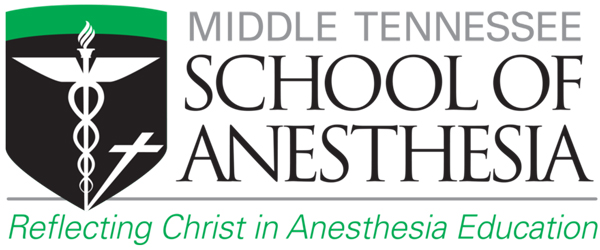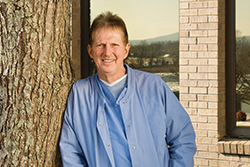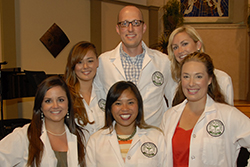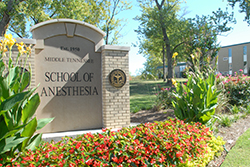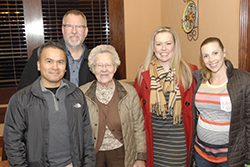January – March 2018
Ertel awarded prestigious President’s Medal
MTSA President’s Medal recipient Michelle Ertel (center) following the presentation by President Chris Hulin and Dr. Ertel’s doctoral committee chairperson Dr. Katrin Sames.
Middle Tennessee School of Anesthesia Doctor of Nurse Anesthesia Practice Graduate Michelle Ertel, DNAP, CRNA, was named the recipient of the President’s Medal at the commencement exercises on Nov. 17, 2017.
The President’s Medal is presented to an outstanding DNAP graduate recognizing his or her scholarly project that may advance the current practice of nurse anesthesia. Doctoral projects are considered using the following criteria:
- Significance of the work to nurse anesthesia practice
- Impact on patient care and safety
- Contribution to the current body of knowledge
- Improvement in a process of healthcare delivery systems
- Mastery of a subject defining expertise in a given area
During the award presentation, MTSA President Chris Hulin, DNP, MBA, CRNA, praised Dr. Ertel’s commitment to discovering and implementing areas of improvement in nurse anesthesia. Her scholarly project is entitled Ventilation Monitoring Outside the Operating Room.
“I was very surprised and grateful to receive the award,” Ertel said. “It was nice to know that the faculty appreciated the hard work it takes to get through the program. My husband, Jim, my parents and my two boys, James and Noah, were at commencement as well. The boys were very excited and proud of their mom, especially because of the ‘big medal’ I received.
“My advisor was Katrin Sames, DNAP, CRNA, and she was fabulous. She’s really energetic and passionate. She made sure that I was on track and thought about all the angles to be able to produce a strong scholarly project,” she said.
Ertel earned her Bachelor of Science in Nursing degree from Illinois Wesleyan University in 2003 and her Master of Science degree with a nurse anesthesia specialization from Southern Illinois University Edwardsville (SIUE) in 2007. She has worked as a CRNA for the past nine years at Anesthesia Associates in Belleville, Ill., a suburb of St. Louis. And she is currently the assistant director of SIUE’s nurse anesthesia program.
Following are excerpts from an extended conversation with Michelle Ertel regarding her experience at MTSA.
Airways: How did you decide to enter the DNAP program at MTSA?
Michelle Ertel: I started lecturing at the Southern Illinois University Edwardsville (SIUE) nurse anesthesia program in 2013 part-time. As entry-level nurse anesthesia programs began the transition to the doctorate level, the timing made sense for me to take the plunge. A colleague, Dr. Andy Griffin, who also graduated from MTSA several years ago, had recommended the program to me and Kevin Stein, who was also in my graduating class at MTSA. With the program being one year full-time, and with my kids at an age where they still went to bed early and I could study at night, it seemed like the best time to do it.
Airways: How difficult is the DNAP program and how did you cope with the challenges?
M.E.: It’s tough but doable. While MTSA has high expectations, all the faculty members were very supportive, which is a key component. It was a whirlwind getting it all done in a year, but I survived! In the beginning I thought I was going to have to completely change my project. Dr. Vollman was very influential in saying “no, you need to be patient. It’s going to work out.” And he was right.
One of the most challenging parts about the scholarly project was making sure I fulfilled all of the requirements that the hospital wanted in order to implement the project and produce quality data.
Airways: Tell us more about your advisor and the role she played in your project.
M.E.: In addition to being my advisor, Dr. Sames was one of our instructors in the course, so I had as much interaction with her in the coursework as with the project. She’s the content expert because she’s also a nurse anesthetist. She always responded quickly when I needed her to and had great enthusiasm. She really pushed me to keep going when I needed it.
Airways: How did you initially become interested in nurse anesthesia?
M.E.: I always knew I wanted to be in healthcare. I discovered nurse anesthesia as a child when my next door neighbor was a nurse anesthetist. When I heard about the field, I explored it and decided that was the path I wanted to follow. Early on, even entering into nursing school, I knew it was something I wanted to pursue.
Airways: How has MTSA’s DNAP program helped with your career growth?
M.E.: It has definitely helped me as a professional. There were certain requests within the hospital that were required for me to be able to implement this project, and that really took me out of the operating room “bubble.” It took me out of that bubble, and allowed me to communicate with other departments and staff in the hospital. I met with the Chief Nursing Officer and attended a research council meeting, which I didn’t even know existed! So it exposed me to a lot of the research and practices within the hospital. In terms of my role at the university, as students are preparing to do their own doctoral projects, it helps me to guide them because I’ve been there and I’ve done it. Obviously now with the DNAP degree, it’s helped me with career advancement. It gave me the opportunity to be the assistant director. If I had not finished the degree I would not have had that opportunity.
Airways: How do you view the challenge of continuing education and disseminating best practices in nurse anesthesia?
M.E.: As nurse anesthetists, our job is very time-consuming and can be very emotionally draining. So to go home and sit and read about the latest research – it’s difficult to consistently summon the energy for that. Often I found that there were practitioners who did not know some of the newer standards of care. Although we have a great professional organization that helps to educate practitioners, there’s still a learning gap that we must always try to address.
Airways: What’s the best part of being in the field of nurse anesthesia?
M.E.: Teaching students is very rewarding. But my passion is still bedside care of the patient. I do still love the clinical practice – giving that patient a safe anesthetic and having them be pain-free and able to go on with their life when they leave the hospital. They get to the recovery room and everything looks great, and they wake up and say “what happened?” They don’t even remember that they went in.
Airways: Now that you’ve completed the DNAP program, what are your reflections on MTSA in general?
M.E.: The program was very well organized. All of the faculty members involved in the doctoral program really make an effort to have the most critical information in the course highlighted. With it being such a fast-paced program, they really have focused on the important areas that we need in order to make an impact, keeping us intrigued and wanting to learn more. All of the faculty are very approachable. So if there was ever a situation that you needed more time, there was some flexibility there. They understood that we’re all full-time working practitioners, many with families. And it was great coming back for each of the intensive weeks. It was a shot in the arm to interact with the faculty and my classmates. We had a really great group of personalities that meshed well.
President's Message: Happy New Year
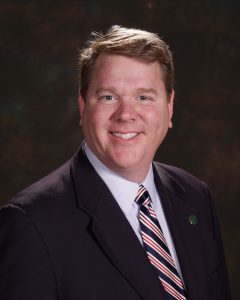
Chris Hulin
DNP, MBA, CRNA
President
As I reflect on 2017, two things are clear to me: MTSA has made significant strides in educating nurse anesthetists; and, we continue to expand the horizons of our profession.
We continue our commitment and investment in student learning as essential to this program. We have just converted to the 36-month Practice Doctorate, which brings us into compliance with the national educational expectation. In addition, we have continued to grow our footprint with regard to acute surgical pain management (ASPM).
The Fellowship has propelled MTSA in the marketplace while providing the platform for National prominence. To continue this momentum, we must increase the focus on scholarship to further enhance the body of knowledge and to produce evidence-based scholarship. We want to better support the practicing CRNA community to provide research findings, publishing, and to become a primary source of knowledge for the field of nurse anesthesia related to ASPM.
MTSA has begun envisioning how we can move this process forward and what this may look like. Part of the equation involves making the best use of our physical space on campus, including the unfinished suite in the Magan Building. The other part is how we harness the power of our collective knowledge to develop a type of “think tank” for nurse anesthesia – where MTSA can serve as a catalyst and coordinator of advancing ASPM practice.
Our graduates work in a variety of settings with fellow nurse anesthetists, thought leaders and clinical practices who are leading the way. MTSA provides researchers, writers and other experts in higher education. A collaborative team approach could produce momentum and synergy of unparalleled scholarship. This concept could drive a “crowdsourcing” of ideas into a forum that allows CRNAs to learn from each other, while displaying the best and brightest in our field.
Being an aggregator of knowledge would enable MTSA to better represent CRNAs on a national scale by developing evidence-based practice (EBP) guidelines. I believe this is the future of our practice. We must always be grounded in evidence, rather than having a loose approach that relies on unproven methodologies, especially as it relates to pain management.
Our main goals – beyond the classroom or simulation lab – are to support scholarship, continue to advance CRNA practice, and support nurse anesthetists in the clinical environment. By operating this “forum of ideas,” our entry-to-practice students could become even more involved and further develop their skills in the field.
As we think and dream about how these efforts might take shape, we want your input as well. Help us brainstorm about how MTSA can continue to lead and further benefit our profession. Consider what you may need to help further your knowledge as a practicing CRNA. I invite you to take some time to formulate a few ideas or guiding philosophies that address the specific needs in your local market – then share them with me. I would love to hear from you.
My hope is that you will find even greater success in 2018 and join with us in growing our profession to the benefit of patients everywhere. Please feel free to contact me with your input on this or any other matter pertaining to nurse anesthesia at chris.hulin@mtsa.edu.
Scholarly Project Review
Improving patient safety outside the operating room
A review of DNAP graduate Michelle Ertel’s scholarly project
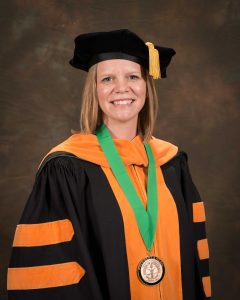
Michelle Ertel, DNAP, CRNA
Continually improving patient care is an endeavor that has always piqued the interest of Michelle Ertel, a 2017 graduate of MTSA’s DNAP program. As a certified registered nurse anesthetist (CRNA) in a hospital setting, she saw the need to explore whether capnography was being utilized to its fullest extent and decided that would be the subject of her scholarly project: Ventilation Monitoring Outside the Operating Room.
Ertel pointed out that in 2011, the American Society of Anesthesiologists (ASA) published a standard of care recommending all anesthesia providers utilize capnography to continuously monitor patient ventilation for not only general anesthetic cases, but also during moderate or deep sedation cases. This came as a result of an evaluation that showed higher incidence of inadequate oxygenation and ventilation cases leading to injury outside of the OR.
“As a practicing nurse anesthetist, I wanted to know whether the standard of care was actually being done 100% of the time as it should be. So I implemented a survey to not only anesthesiologists and CRNAs but also to registered nurses who are providing sedation outside of the operating room, such as in the ER, cath lab and ICU,” Ertel said.
Ertel’s project revealed that:
- Capnography is not being utilized during moderate sedation procedures outside of the OR, therefore patient safety remains at risk.
- Collaboration between multidisciplinary teams is needed to establish up-to-date moderate sedation protocols within healthcare institutions.
- Collaboration is also needed to educate all disciplines involved with patient ventilation monitoring during moderate sedation.
“The survey was implemented in the hospital setting where I work, so the results were on par with what I was expecting. But I was also a bit surprised that there were still that many anesthesia providers not utilizing it outside the operating room,” Ertel said.
She points out the need for improved access to capnography equipment outside of the OR for moderate sedation procedures. And she contends that all providers monitoring patient ventilation during moderate sedation procedures need to be better educated on best practices.
Ertel added, “This was certainly an eye-opening research project. Going forward I hope to bring more awareness of the importance of using capnography outside of the operating room. This is an area of patient safety that can be greatly improved.
“I want to thank Dr. Overstreet for providing valuable feedback on this project, my committee chair Dr. Sames for all of her efforts throughout the entire program, and to Dr. Vollman for his invaluable guidance,” Ertel said.
2017 Commencement Exercises held
Degrees conferred on MS, DNAP graduates
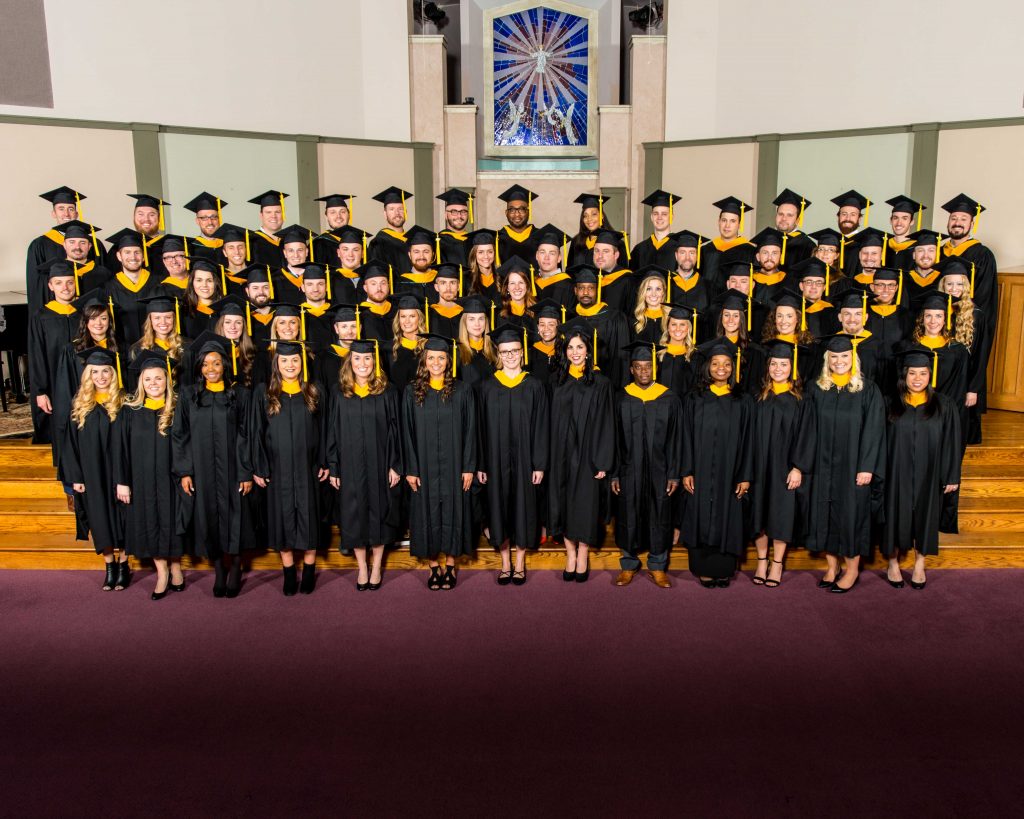
Class of 2017 Master of Science with a Focus in Anesthesia graduates.
Middle Tennessee School of Anesthesia hosted Commencement Exercises for the Class of 2017 on Friday, Nov. 17, 2017, at the Madison Campus Seventh-day Adventist Church. The program was streamed live on YouTube, and a video of the event is available at www.YouTube.com/MTSAnesthesia.
Mary Elizabeth “Ikey” DeVasher, PhD, CRNA, Dean Emerita, led the procession of the MTSA board of trustees, administration, faculty and graduates while carrying the MTSA mace. Class of 2017 graduate Will Foster offered the invocation, following a welcome message from President Chris Hulin.
MTSA board member Kenneth Schwab gave opening remarks followed by graduate Dominique Peart, who introduced the first speaker, Kenneth E. Wetmore, MA, Senior Pastor, Madison Campus Seventh-day Adventist Church. Graduate Britney Goldstein introduced the keynote speaker, Dr. Claude O. Pressnell, Jr., EdD, President, Tennessee Independent College and University Association. His address was followed by remarks from MTSA Program Administrator Rusty Gentry, DNAP, CRNA.
Dr. Hulin presented diplomas to graduates of both the Masters and Doctor of Nurse Anesthesia Practice degrees, after which he presented the graduate awards. The ceremony was closed with a special musical presentation by graduates Nick Pagliari, Spencer Stanton and Roderick Turner and a benediction by graduate Nathan Donaldson.
Class of 2017 Clinical Experience
Each year MTSA graduates well-exceed requirements of the Council on Certification of Nurse Anesthesia Programs (CCNA) regarding the number of cases and procedures for clinical experiences in order for the candidate to be eligible to take the National Certification Examination.
CCNA sets the required numbers of cases and procedures for clinical experiences in order for the candidate to be eligible to take the National Certification Examination.
The following statistics are derived from the information provided to the CCNA for certification requirements for the graduates as of Nov. 1, 2017. CCNA requires a minimum number of 600 cases. The average number of cases performed by members of the class of 2017 was 903 cases. The graduate with the highest number of cases performed was Tevis Smith who had 1,111 cases.
CCNA requires a minimum of 850 hours of clinical time. The average number of hours spent actually doing anesthesia by the members of the class of 2017 was 1,553 hours. The graduate with the most hours of anesthesia time was Ben Christian with 2,193 hours.
CCNA requires each graduate to have administered anesthesia to at least 40 pediatric patients. Members of the class of 2017 performed an average of 171 anesthetics for pediatric patients. The graduate with the highest number was Morgan Baumgartle with 272 pediatric cases.
CCNA requires each graduate to have provided anesthesia for at least 30 obstetrical patients. The average number of anesthetics in this category for members of the class of 2017 was 93. The graduate with the highest number was a tie – T. J. Carpenter and Grant Visbeen with 161 obstetrical patients.
Graduates from all programs across the United States are required to perform a minimum of 35 regional anesthetics. These 35 can be from a combination of all categories of regional anesthesia. The members of this graduating class administered an average of 119 regional anesthetics. Epidural and spinal anesthesia are techniques of regional anesthesia. The members of this class performed an average of 28 spinal anesthetics and an average of 65 epidurals.
GRADUATE AWARDS
During the graduation ceremony, awards were presented to the following graduates:
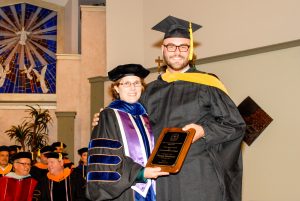
Team Spirit Award: Nathan Donaldson
This award is voted on solely by Masters students and given to the person in their class who has continually offered encouragement and was always willing to lend a helpful hand.
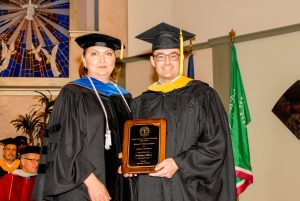
Bernard Bowen Award for Academic Excellence: Nathan Silva
This award is named for the founder and first Program Director of the school of nurse anesthesia in 1950. The recipient was chosen by votes from the MTSA faculty and administration. The student selected for this award must have upheld the mission and core values of MTSA, achieved a GPA of 3.75 or higher, exhibited professionalism during interaction with classmates and academic faculty, and fostered a spirit of academic excellence beyond the expectations and degree requirements.
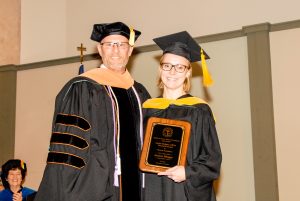
Agatha Hodgins Award for Clinical Excellence: Jessica Slinger
This award is named for the founder and first president of the American Association of Nurse Anesthetists. Ms. Hodgins was also a strong advocate for the education of nurse anesthetists. The clinical affiliates of Vanderbilt, General Hospital, along with MTSA Administration, had input into the selection of the recipient for this award. The student selected for this award must have upheld the mission and core values of MTSA, achieved a GPA of 3.75 or higher, and exhibited professionalism during interaction with clinical faculty and classmates, and fostered a spirit of clinical excellence beyond the expectations and degree requirements.
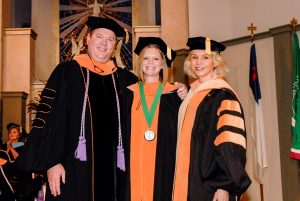
President’s Medal: Michelle Ertel
This is an award voted on by the doctoral faculty for the candidate whose doctoral work advances or has the potential to impact the current practice of nurse anesthetists locally, nationally, or even globally. See special feature on Ertel’s award and project on page in this issue of Airways.
DNAP graduate earns degree while deployed in Afghanistan
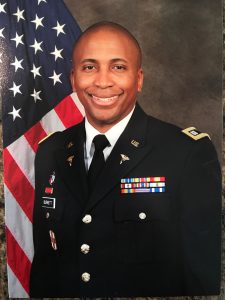
Lukman Burnett, DNAP graduate
Although Lukman Burnett was not able to attend the MTSA Commencement due to his deployment to Afghanistan, his degree was still conferred along with all the other DNAP graduates on Nov. 17.
Burnett is assigned to the 933rd Forward Surgical Team out of Paducah, Ky. He is currently deployed to Camp Dahlke, Afghanistan, and is one of two CRNAs at his current location providing anesthesia care for patients unable to survive evacuation to a higher level of care within the “golden hour” of injury. Surgeons perform damage control surgery so that the casualties can then be packaged for medical evacuation to a higher level of care.
The title of Burnett’s DNAP scholarly project is Vasoplegic Syndrome: Perioperative Implications and Pharmacological Management for Anesthesia Providers.
MTSA faculty, staff, students and alumni join together in thanking Lukman for his service and wishing him a continued safe deployment.
National CRNA Week
The Future of Anesthesia Care Today
During the week of Jan. 21-27, MTSA will join the celebration of anesthesia patient safety and the nation’s 52,000+ Certified Registered Nurse Anesthetists and student registered nurse anesthetists who safely and cost-effectively provide approximately 43 million anesthetics each year.
The theme for this year’s National CRNA Week is “The Future of Anesthesia Care Today.” The event helps patients, hospital administrators, healthcare professionals, policymakers, and others become more familiar with the CRNA credential and the exceptional advanced practice registered nurses who have earned it.
Students, alumni and guests are invited to the MTSA Lecture Hall, Bldg. A, on Monday, Jan. 22, at 1 p.m. for tasty treats and door prizes. Be sure to watch for a variety of messages on social media from MTSA in commemoration of this special week.
MTSA graduates receive award from SAU
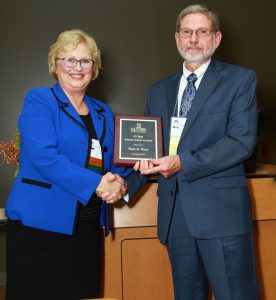
Bevin Brown (above right), AS, RN, CRNA
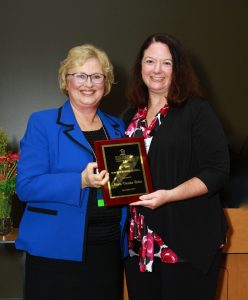
Alescia DeVasher Bethea (above right), AS, BS, MS, PhD, CRNA, APRN
Bevin Brown, AS, RN, CRNA, and Alescia DeVasher Bethea, AS, BS, MS, PhD, CRNA, APRN, both graduates of MTSA, were recently honored by Southern Adventist University School of Nursing as Nursing Alumnus of the year during its homecoming.
Brown (’71) was recognized as the 50-year honoree, and Bethea (’95) received the 25-year award. The nominations were based on distinction in practice, education/certification, leadership and service.
Brown and his dad, Newell G. Brown (’64), were the first father and son to graduate from MTSA. Bevin works full-time at Troy Regional Medical Center, Troy, Ala.
Bethea is program administrator, associate professor and department chair at Adventist University of Health Sciences in Orlando, Fla. Her family connections to MTSA include her parents, Mary Elizabeth “Ikey” DeVasher, dean emerita and former program administrator, and Bernard DeVasher, former adjunct faculty.
Mission Initiative update
MTSA students and administrators are gearing up for the first of three mission trips to Guyana this year. The first trip will take place Jan. 28. The team will be delivering curriculum and running simulations with students in the nurse anesthesia program at Georgetown Public Hospital System (GPHS), which is located in Guyana’s capital.
Part of the instruction will cover induction and emergence as well as running simulations for basic anesthesia skills such as intubation and patient positioning.
Skyscape has donated its Anesthesiology Constellation mobile application, a customizable solution that integrates a wide range of resources and tools. The app will be loaded on iPads, which were purchased via the generous support raised from last year’s Gala and Sporting Clay events.
In addition, the students will receive Morgan and Mikhail’s Clinical Anesthesiology to replace the program’s current textbooks.
The GPHS nurse anesthesia program has graduated a total of 30 nurse anesthetists, and there are currently seven students in the program. The country of Guyana is located just east of Venezuela, in South America.
Two additional trips to Guyana are scheduled for this summer and fall, helping the students as they progress through the anesthesia curriculum.
Photos from MTSA’s most recent Haiti mission trip:
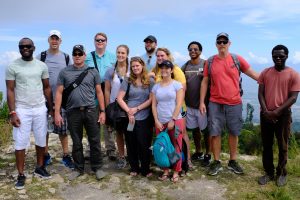
MTSA students and administrators traveled to Haiti last October with hand surgeons from the Touching Hands Project.
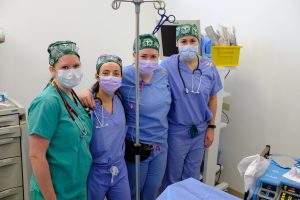
Class of 2018 SRNAs (l to r) Jo Elliott, Megan Bradford, Jordan Scott and Alyssa Alger helped conduct BLS and ACLS education sessions for local doctors and nurses during MTSA’s mission trip to Haiti in October.
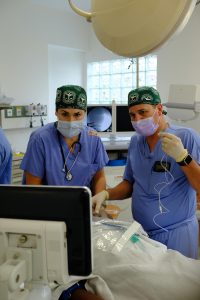
(l to r) Alyssa Alger, MTSA Class of 2018, and Stace Dollar, CRNA, provide acute surgical pain management care at Hopital Adventiste d’Haiti in Carrefour.
MTSA graduate provides hurricane relief in Puerto Rico
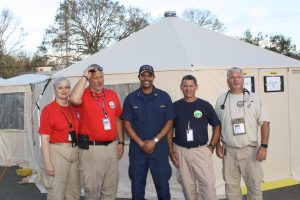
Jamie Gill (far right), CRNA, joined with a team that served the people of Puerto Rico following hurricane Irma last fall.
MTSA graduate Jamie Gill, CRNA, was given the opportunity to serve the people of Puerto Rico following hurricane Irma last fall. He served as operations chief, providing emergency care for the victims in the cities of San Juan and Fajardo.
His team’s efforts were recognized with a personal visit by the U.S. Surgeon General Dr. Jerome Adams, who is an anesthesiologist.
“I will continue to represent our school at every opportunity I can and hope to continue sharing some of the knowledge that I obtained while attending MTSA,” Gill said.
Interested in serving on a mission trip? MTSA will post mission opportunities on its website, along with contact information of the organizations leading those efforts, so you can participate if you’re able. Visit www.mtsa.edu/missions.
MTSA students facilitate continuing education on transfusion protocol
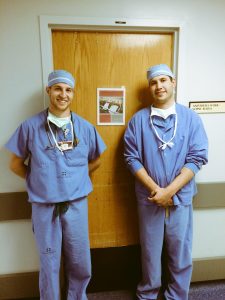
MTSA students (l to r) Jeremy Bach and Eric Estes presented research findings at Baptist Health Lexington.
As part of a senior elective, MTSA students Jeremy Bach and Eric Estes recently delivered research findings during a meeting with staff and administrators at Baptist Health Lexington in Kentucky as part of its Anesthesia Ground Rounds series.
“We were asked to complete an educational presentation similar to the Grand Rounds at Vanderbilt,” Bach said. “They challenged us to discuss something that the hospital does not see on a regular basis: massive blood transfusion protocol.”
The presentation required extensive research as well as a time commitment including extra hours in the operating room comparing other protocols and making changes based on their findings. Their goal was to educate everyone on how and when to implement the protocol.
According to Estes, the presentation was well-received by the staff. “It was a bit intimidating to stand in front of highly experienced CRNAs, anesthesiologists and the cardiovascular chair, but it opened up an important conversation that everyone was able to engage in.”
“We wanted to help prepare the team for a situation that they don’t always see on a regular basis. When the need for a massive blood transfusion arises, we wanted them to know what to expect and be ready to handle it,” Bach said.
“We learned a lot through the process of researching and presenting the information,” Estes added. “It was a great feeling of accomplishment to facilitate the discussion and know that the group is better prepared now than they were before.”
MTSA’s 5th annual Mission & Awards Gala set for May 17
Proceeds will benefit Mission Initiatives in Haiti, Guyana

The 5th annual MTSA Mission & Awards Gala will be held Thursday, May 17, and will benefit Mission Initiatives in Haiti and Guyana.
Planning is underway for the 5th annual MTSA Mission & Awards Gala presented by Anesthesia Medical Group to be held Thursday, May 17, at the Westin Nashville, announced Jordan Miller, CRNA, chairman. As in previous years, the event supports MTSA’s Mission Initiatives, including trips to Guyana and Haiti planned throughout this year.
“Our mission work in Haiti has made a lasting impact,” said MTSA President Chris Hulin. “We’re excited to be adding Guyana to our mission efforts this year. It’s an honor to help educate nurses and provide clinical assistance with the help of so many who have donated to this important endeavor. We are deeply appreciative of everyone who is able to support us this year.”
Five awards will be presented as nominated by MTSA alumni and community friends including: Mary Elizabeth “Ikey” DeVasher Alumni Distinguished Service Award; Nevin Downs, MD Leadership Award; Clinical Excellence Award; Philanthropy Award; and Mission & Heritage Award.
The Gala also helps build community involvement, support and awareness for MTSA while honoring alumni, individuals, community partners and others for their involvement with the School.
The evening will include a reception, dinner, entertainment and award ceremony. The event is open to all including alumni, faculty, students, physicians, medical groups, corporations and individuals. There are several sponsorships available, in addition to table sponsors and individual tickets.
For more information, contact the MTSA Advancement & Alumni Office at (615) 732-7674 or visit www.mtsa.edu/gala.
Save the date for 2nd annual Sporting Clay Tournament
MTSA’s 2nd annual Sporting Clay Tournament returns on Friday, Nov. 9, 2018. Proceeds from the event benefit MTSA’s Mission Initiative.
Team registration and sponsorship opportunities are available now by visiting www.mtsa.edu/sportingclay.
Drs. Overstreet and Krau guest-edit medical journal
MTSA Dean Maria Overstreet, PhD, RN, and colleague Stephen D. Krau, PhD, RN, CNE, served as guest editors for the current issue of Critical Care Nursing Clinics of North America.
“Collaborating with Dr. Krau is always a delight, and I continue to learn every time I work with him,” Overstreet said. “We chose the topic of pain management as we were contributing to the initial plans for the Acute Surgical Pain Management Fellowship at MTSA.”
The collection of articles is meant to challenge nurses to reevaluate their knowledge level of pain as well as gain an appreciation for alternative therapies to share with their colleagues, according to Overstreet.
“I’d like to congratulate Dr. Overstreet and Dr. Krau on contributing their time and expertise to this worthy endeavor. They continue to represent our School and profession with strong thought-leadership on this critical issue,” said MTSA President Chris Hulin.
The journal articles cover topics such as the Physiology of Pain, the Role of Pain Classification Systems in Pain Management, and Pharmacologic Interventions for Pain Management, among others.
MTSA granted regional approval for Practice Doctorate
Amy Gideon, EdD, Director of Institutional Effectiveness, reported receipt of a letter dated September 15, 2017, from the Southern Association of Colleges and Schools Commission on Colleges (SACSCOC), which stated:
The Board of Trustees of the Southern Association of Colleges and Schools Commission on Colleges reviewed the materials seeking approval of the Practice Doctorate (P.D.) Doctor of Nurse Anesthesia Practice (D.N.A.P.) degree program. It was the decision of the Board to approve the program and include it in the scope of the current accreditation.
“While MTSA has offered a DNAP completion program for CRNAs since 2013, this approval allows the School to move forward with the Practice Doctorate DNAP program, with the first class beginning this month,” Gideon said.
The Practice Doctorate consists of a three-year program with an online first semester, integration of clinical rotations in the third semester, and completion of a scholarly project in the third year.
MTSA’s final Master of Science class, scheduled to graduate in November 2019, began in July 2017.
For more information about the Practice Doctorate program visit www.mtsa.edu/practicedoctorate.
Ambu donates equipment to MTSA program
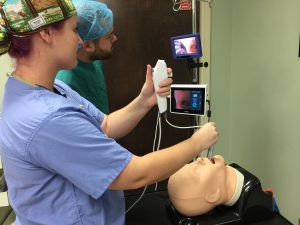
Equipment donated by Ambu is used as part of SRNAs’ airway and one-lung ventilation scenarios. The donation included endotracheal tubes, fiberoptic bronchoscopes and monitors.
Ambu recently donated new equipment for MTSA’s use in the simulation lab, including two Vivasight double lumen endotracheal tubes, a 4×6” monitor, three fiberoptic bronchoscopes and a 14” monitor.
“The donation came about through a clinical partnership involving myself, Vanderbilt University Medical Center and Ambu,” said John Shields, DNP, CRNA, Vanderbilt Heart and Vascular Institute. “We would like to thank Bridget Boice with Ambu who facilitated this very generous donation.”
According to Shields, SRNAs use this equipment as part of their difficult airway and one-lung ventilation scenarios. Advanced airway and chest surgery techniques are taught both academically and through simulation/hands on skills development. This equipment complements the Laerdal simulation mannequin and the Trucorp AirSim Advanced Bronchi training models.
“Fiberoptic bronchoscopes are very delicate and prone to damage, with repair costs approaching $4,500 with each event. These disposable bronchoscopes are very durable and easily replaced. In addition, the large screen allows multiple users and teaching. The new Vivasight technology is state-of-the-art and is a true game-changer in the thoracic operating room,” Shields said.
MTSA provides anesthesia for 10-20 operating rooms per day at Vanderbilt, and its students are regularly exposed to thoracic surgery including trauma and fiberoptic intubation.
Shields points out that in the simulation lab, having a realistic simulated operating room with all the latest equipment is essential and that MTSA has aggressively pursued the necessary equipment through its budget and outside donations.
“Students are very enthusiastic and embrace the technology. We regularly receive comments such as ‘I did this case the other day, and it went just like in simulation.’ So all equipment we have goes to very good use,” Shields added.
From the Archives: Patient care in the 1950s
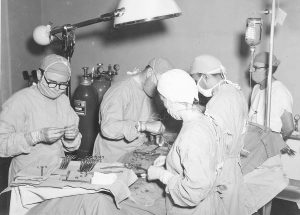
MTSA alumnus Alex Brown (’56), far left, tends to a patient during surgery. The photo was taken in the mid-1950s at Madison Hospital and provided by Brown’s daughter, Vicki Davies, Vice President of Kettering Health Network, Kettering, Ohio. Davies is the Finance Committee Chair and Interim Vice Chair of the MTSA Board of Trustees.


